The foulmouthed brats of South Park don't look especially Taiwanese as they scurry across animated snow-covered landscapes, so it may seem odd to viewers familiar with the English version of the show when they open their mouths and crack jokes about Lee Teng-hui (李登輝) in a mixture of Mandarin and Taiwanese.
On other shows, Taiwanese emcees replace the original Western hosts and the formats of popular Western game shows are copied wholesale, but with the substitution of Taiwanese hosts and competitors.
Often through reformatting, rewriting entire scripts or by adding a local celebrity to be a program host, some of the country's non-Mandarin-language cable TV stations are adapting their programming by localizing their content in the hope of expanding their audience and boosting ratings.
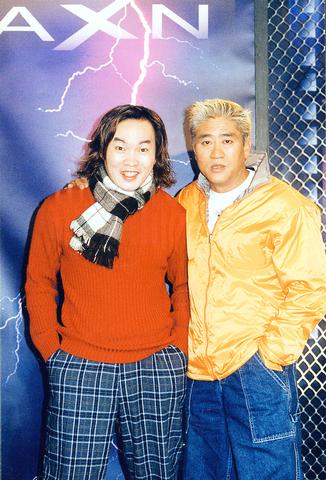
PHOTO COURTESY OF AXN
Looking to stand out
Leading the charge to diversify their content and include more recognizably local elements are AXN, Star TV, Disney Channel and Power TV, all of which have realized that their brand recognition as foreign-language channels no longer constitute a distinct advantage in attracting viewers.
"With the number of television channels in Taiwan now, it's becoming increasingly difficult to stand out if you don't include some localized broadcasts," explained Cindy Liu (
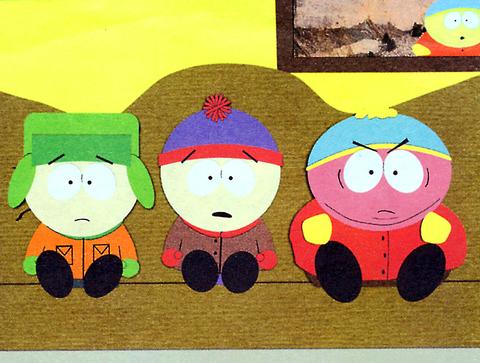
PHOTO COURTESY OF STAR TV
"People presume you're just another channel that airs foreign programs. If you want to be recognized as more than another foreign-language station, then you have to include programs with local content and make more shows relevant to Taiwan. What has viewers transfixed in North America, for example, isn't necessarily going to interest anyone in Taiwan."
Early last week the latest evidence of the localization of Taiwanese TV was beamed into homes in the form of a local take on the hugely popular Survivor series which revolutionized so-called reality TV in the US, England and Australia. In the Power TV show, contestants were forced to live in a plexiglass box without food for five days.
The challenge may not have been as death-defying as those on Western versions of reality TV shows, but this didn't deter masses of viewers from tuning in to gawk at nine starving people stuck in a clear plastic box.

PHOTO COURTESY OF AXN
Lost in translation
Not all localization drives, however, are as successful as Power TV's. Many viewers are put off by what often ends up as awkward translations and stilted humor.
Billy Huang (黃炳雲), vice president of the Disney Channel Taiwan, is painfully aware of the difficulties in adapting shows to local audiences.
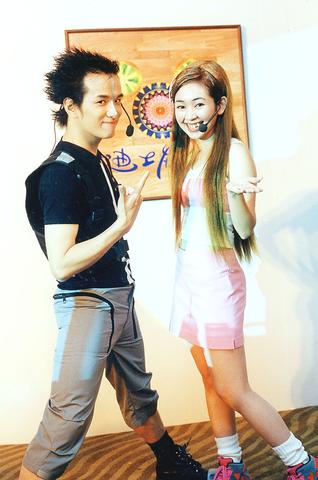
PHOTO COURTESY OF DISNEY
"Not all programs travel well. I remember we were running the Golden Girls series a few years ago and there was a joke about the smell of cheese in one episode. Well, we didn't think that the smell of cheese was relevant in Taiwan, so we replaced cheese with stinky tofu when we wrote the subtitles," recalled Huang. As a result, the station was inundated by calls from outraged viewers who felt the planting of stinky tofu on a purely American TV show was unacceptably fake. They wanted the show translated verbatim.
In a recent viewer survey, Disney Taiwan discovered that the popularity of localization depended on the type of program. According to Huang, television audiences in Taiwan don't mind the dubbing and slight alterations of scripts on cartoons, but draw the line at movies.
"We've found that viewers don't want to see a cowboy or a New York cop speaking in Mandarin," Huang said. "Who would? It just looks stupid."
The ultimate translation riddle for stations, however, has been transferring the dialogue of foreign comedy shows or cartoons into comprehensible and humorous Mandarin.
When MTV first began to air the infamous cartoon duo Beavis and Butthead with Chinese subtitles in 1997 the company found that direct translations of profanity and jokes weren't funny in Mandarin in part because they were more offensive than the terms' meanings in English. So the channel watered down the translations of profanity and the show became a smash hit.
More recently, Star TV ran into the same problems when it began to air its dubbed version of South Park. Direct translation of the cartoon proved impossible. Station programmers opted instead to rewrite the entire script. Jokes with references to issues, people and places familiar to audiences in the US were replaced with subject matter more relevant to Taiwan.
Two of the most popular episodes of Taiwan's South Park were aired during Taiwan's 2000 presidential campaign. The computer-animated kids poked fun at all three presidential candidates and at Lee Teng-hui for his controversial interpretation of cross-strait relations as state-to-state in nature in the summer of 1999. For all the potential missteps, South Park has managed to emerge as one of the most popular TV shows on Taiwanese TV.
Localization of television isn't always just a matter of deftly translating and rewriting scripts. Often entire programs are re-edited and re-formatted to include a local celebrity host, whose job it is to bring some local flavor to the programming.
After an abortive attempt at re-creating an extreme sports show from the US, AXN's programmers came up with a far more successful localization project with a show titled The World's Most Amazing Videos (飛越生死線). The show, purchased from NBC of the US, features home videos of disasters, silly accidents, daring feats and embarrassing situations. With the simple addition of a Taiwanese host -- in this case stuntman Ko Hsiou-liang (柯受良) -- the show proved so popular that although it originally aired for one run in April, 2000, the station still broadcasts re-runs each week.
"The show was really popular. We purchased the original show and simply added film of Ko in place of the show's original host," Liu said. "We did try to make localized additions with locally recorded videos, but after about a month we'd used up all the videos we received. I don't think people in Taiwan like the thought of being seen on television making fools of themselves or getting hurt. I think it's a question of face."
Making it on their own
With the ratings war heating up between so many channels on Taiwan's cable TV market, stations are having to dig deeper into their wallets to successfully localize their content, and have begun producing their own shows.
Disney is looking to build on the success of it's imported kids show, Disney Mailbox (迪士尼信箱), which began airing five years ago and is hosted by the charismatic Arthur Chang (張洛君) and Vega Tsai (蔡燦得). The three-minute show has had a huge response from viewers, leading the station to begin producing a three-hour version of the show that will run Mondays to Fridays.
Aiming for a slightly more mature audience, AXN is looking to capitalize on a remake of the 1970s TV show Charlie's Angels.
Set to air in September, Asian Charlie's Angels (幻影天使) is not only the station's most ambitious project to date, but is also the most costly project aimed at localizing a successful overseas program by a local cable TV station.
Covering all its broadcast bases, AXN chose three angels -- Wu Chen-chun (吳辰君) from Taiwan, Lin Hsi-lei (林熙蕾) from Hong Kong and Qu Ying (瞿穎) from China. In a further bid at geographical parity, the action series even boasts a production crew from Hong Kong and Taiwan and was filmed on location in China.
"The show is one of a kind. No other company in Taiwan has ever attempted anything like this before. Instead of just aiming the program at audiences in Taiwan we have come up with a program that can be aired as a localized show in Hong Kong, China and Taiwan," explained AXN marketing manager Edith Liang (梁家珍).
If the show proves as successful as AXN hopes, then we could begin to see other channels splashing out on big-budget, localized productions and before too long Taiwan may get its own Six Million New Taiwan Dollar Man.
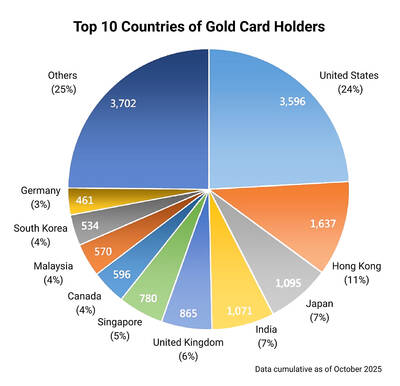
Seven hundred job applications. One interview. Marco Mascaro arrived in Taiwan last year with a PhD in engineering physics and years of experience at a European research center. He thought his Gold Card would guarantee him a foothold in Taiwan’s job market. “It’s marketed as if Taiwan really needs you,” the 33-year-old Italian says. “The reality is that companies here don’t really need us.” The Employment Gold Card was designed to fix Taiwan’s labor shortage by offering foreign professionals a combined resident visa and open work permit valid for three years. But for many, like Mascaro, the welcome mat ends at the door. A
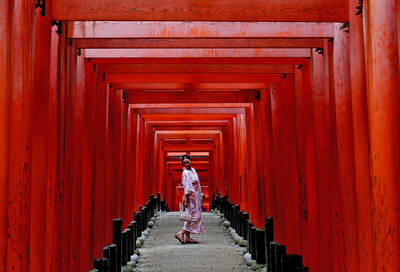
The Western media once again enthusiastically forwarded Beijing’s talking points on Japanese Prime Minister Sanae Takaichi’s comment two weeks ago that an attack by the People’s Republic of China (PRC) on Taiwan was an existential threat to Japan and would trigger Japanese military intervention in defense of Taiwan. The predictable reach for clickbait meant that a string of teachable moments was lost, “like tears in the rain.” Again. The Economist led the way, assigning the blame to the victim. “Takaichi Sanae was bound to rile China sooner rather than later,” the magazine asserted. It then explained: “Japan’s new prime minister is
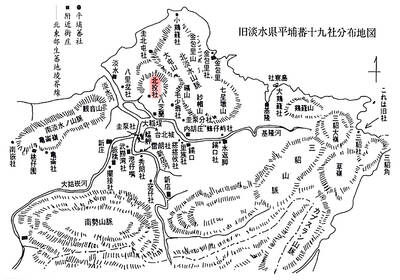
NOV. 24 to NOV. 30 It wasn’t famine, disaster or war that drove the people of Soansai to flee their homeland, but a blanket-stealing demon. At least that’s how Poan Yu-pie (潘有秘), a resident of the Indigenous settlement of Kipatauw in what is today Taipei’s Beitou District (北投), told it to Japanese anthropologist Kanori Ino in 1897. Unable to sleep out of fear, the villagers built a raft large enough to fit everyone and set sail. They drifted for days before arriving at what is now Shenao Port (深奧) on Taiwan’s north coast,
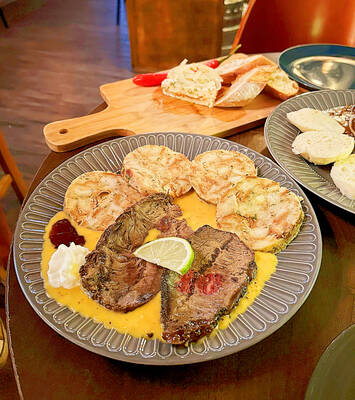
Divadlo feels like your warm neighborhood slice of home — even if you’ve only ever spent a few days in Prague, like myself. A projector is screening retro animations by Czech director Karel Zeman, the shelves are lined with books and vinyl, and the owner will sit with you to share stories over a glass of pear brandy. The food is also fantastic, not just a new cultural experience but filled with nostalgia, recipes from home and laden with soul-warming carbs, perfect as the weather turns chilly. A Prague native, Kaio Picha has been in Taipei for 13 years and